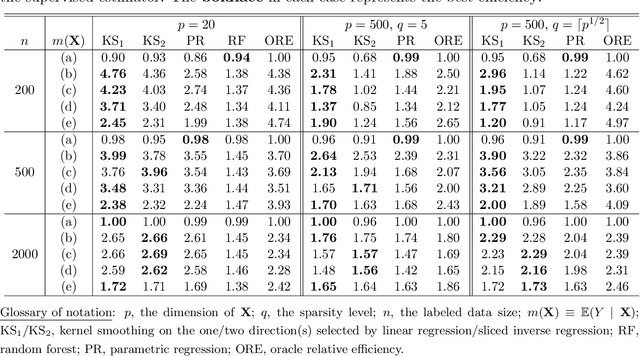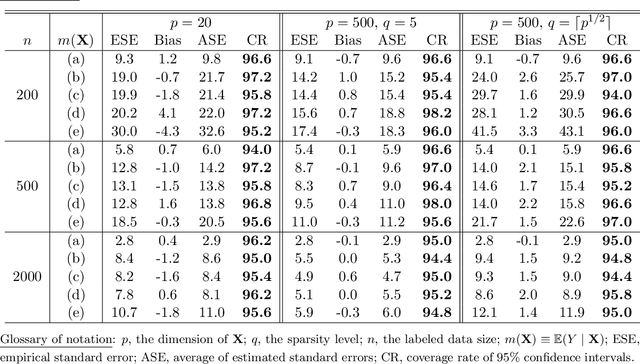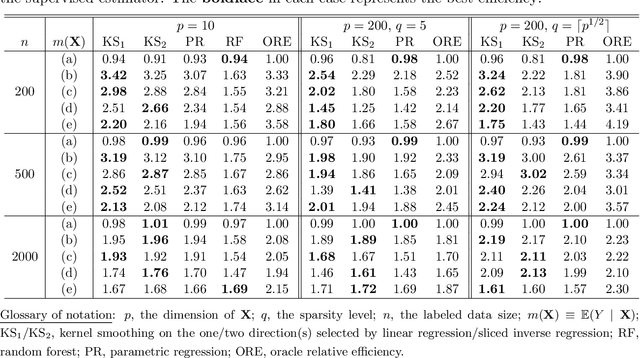Guorong Dai
Semi-Supervised Quantile Estimation: Robust and Efficient Inference in High Dimensional Settings
Jan 25, 2022



Abstract:We consider quantile estimation in a semi-supervised setting, characterized by two available data sets: (i) a small or moderate sized labeled data set containing observations for a response and a set of possibly high dimensional covariates, and (ii) a much larger unlabeled data set where only the covariates are observed. We propose a family of semi-supervised estimators for the response quantile(s) based on the two data sets, to improve the estimation accuracy compared to the supervised estimator, i.e., the sample quantile from the labeled data. These estimators use a flexible imputation strategy applied to the estimating equation along with a debiasing step that allows for full robustness against misspecification of the imputation model. Further, a one-step update strategy is adopted to enable easy implementation of our method and handle the complexity from the non-linear nature of the quantile estimating equation. Under mild assumptions, our estimators are fully robust to the choice of the nuisance imputation model, in the sense of always maintaining root-n consistency and asymptotic normality, while having improved efficiency relative to the supervised estimator. They also attain semi-parametric optimality if the relation between the response and the covariates is correctly specified via the imputation model. As an illustration of estimating the nuisance imputation function, we consider kernel smoothing type estimators on lower dimensional and possibly estimated transformations of the high dimensional covariates, and we establish novel results on their uniform convergence rates in high dimensions, involving responses indexed by a function class and usage of dimension reduction techniques. These results may be of independent interest. Numerical results on both simulated and real data confirm our semi-supervised approach's improved performance, in terms of both estimation and inference.
A General Framework for Treatment Effect Estimation in Semi-Supervised and High Dimensional Settings
Jan 24, 2022



Abstract:In this article, we aim to provide a general and complete understanding of semi-supervised (SS) causal inference for treatment effects. Specifically, we consider two such estimands: (a) the average treatment effect and (b) the quantile treatment effect, as prototype cases, in an SS setting, characterized by two available data sets: (i) a labeled data set of size $n$, providing observations for a response and a set of high dimensional covariates, as well as a binary treatment indicator; and (ii) an unlabeled data set of size $N$, much larger than $n$, but without the response observed. Using these two data sets, we develop a family of SS estimators which are ensured to be: (1) more robust and (2) more efficient than their supervised counterparts based on the labeled data set only. Beyond the 'standard' double robustness results (in terms of consistency) that can be achieved by supervised methods as well, we further establish root-n consistency and asymptotic normality of our SS estimators whenever the propensity score in the model is correctly specified, without requiring specific forms of the nuisance functions involved. Such an improvement of robustness arises from the use of the massive unlabeled data, so it is generally not attainable in a purely supervised setting. In addition, our estimators are shown to be semi-parametrically efficient as long as all the nuisance functions are correctly specified. Moreover, as an illustration of the nuisance estimators, we consider inverse-probability-weighting type kernel smoothing estimators involving unknown covariate transformation mechanisms, and establish in high dimensional scenarios novel results on their uniform convergence rates, which should be of independent interest. Numerical results on both simulated and real data validate the advantage of our methods over their supervised counterparts with respect to both robustness and efficiency.
 Add to Chrome
Add to Chrome Add to Firefox
Add to Firefox Add to Edge
Add to Edge